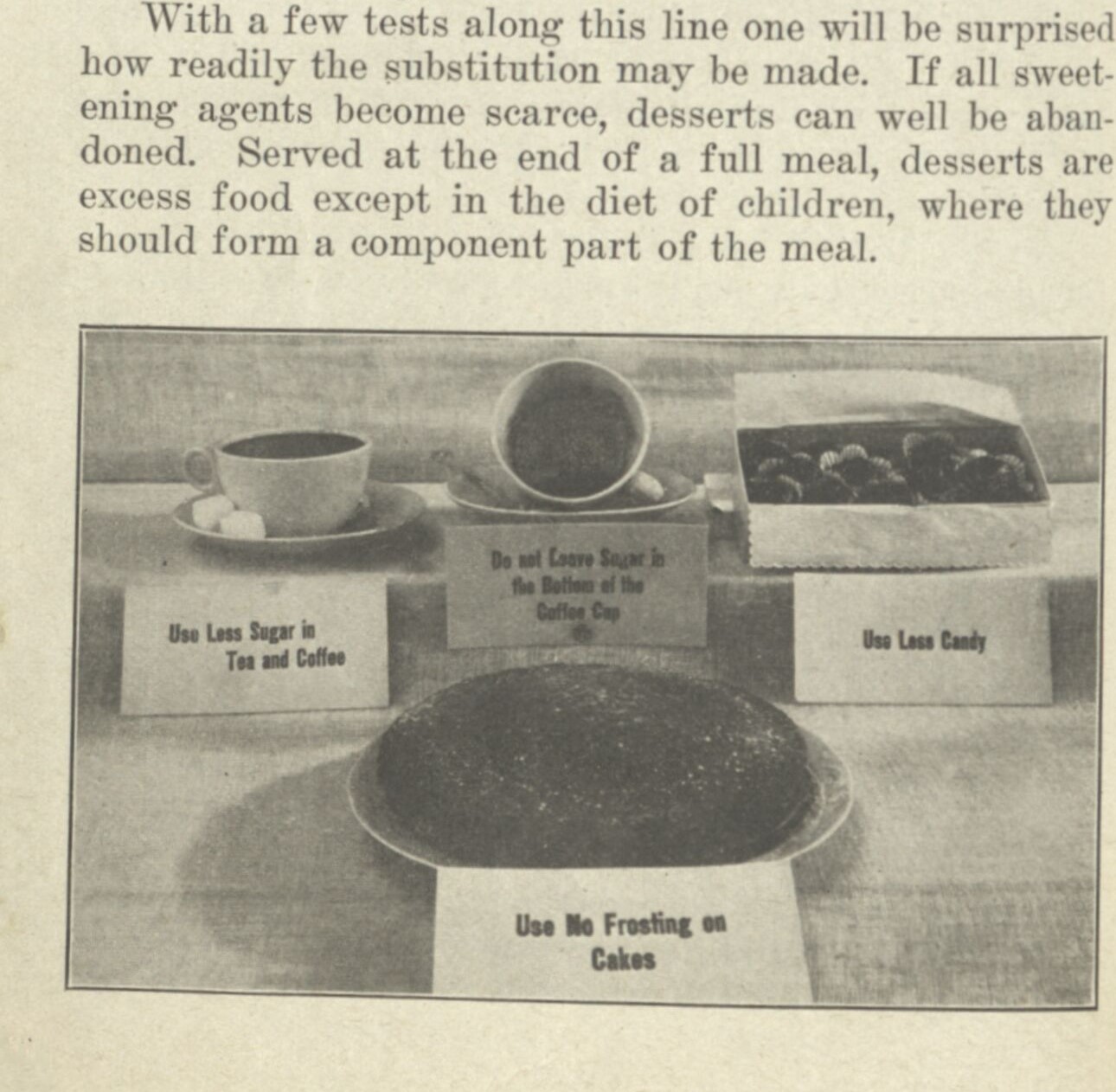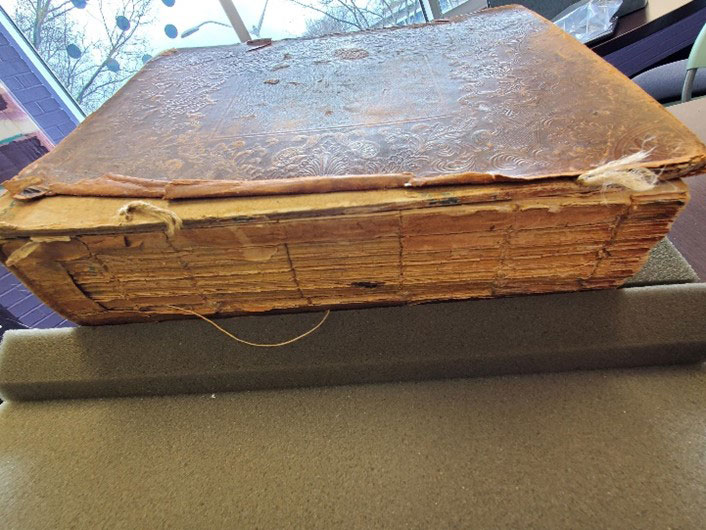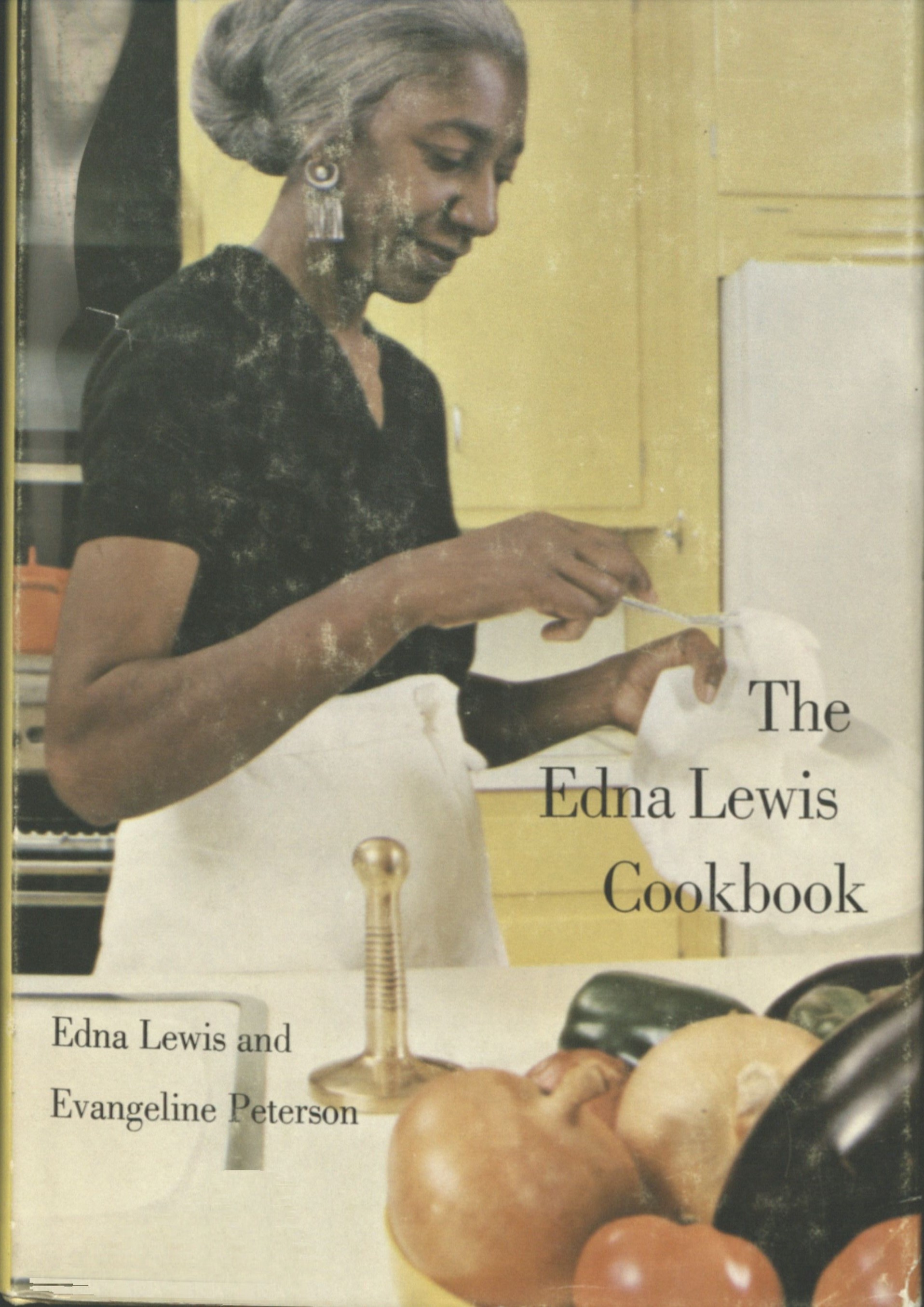
Edison Cylinders at the Bentley Rare Book Museum
KENNESAW, Ga. | Apr 27, 2022
Student historian Andrew Bramlett discusses his research on the development of recorded sound and the Bentley Rare Book Museum's collection of wax cylinder records invented by Thomas Edison.
Music in the year 1900 was vastly different from music a century before. While new styles and genres had emerged, the most noticeable change was how music was played (and replayed). The person most closely connected to this change was Thomas Edison, who emerged in American pop culture as an ingenious innovator. While Edison's legacy has been more complicated in recent years, mainly because of him taking credit for the work of others and his rivalry with Nikola Tesla, the "Wizard of Menlo Park" remains a significant influence on the development of contemporary America.
Edison was largely deaf but still appreciated music. His first successful invention, the phonograph, utilized a tinfoil-wrapped drum to record and replay audio. To record, words were spoken into the phonograph while a needle created grooves in the rotating foil. To play the audio back, the needle read the grooves on the spinning drum and the sound was amplified by a large horn. Unfortunately, this was not loud enough for Edison to hear. To listen to songs on his invention, Edison would bite into the wood and feel the vibrations in his skull. Some of his personal phonographs still have his bite marks.
The first use of the phonograph was in 1877 when Edison recited "Mary Had a Little
Lamb." While the original recording has not survived, a recreation made by Edison
fifty years later has been made available online. The tinfoil used in the original
phonograph was a weak and brittle material, but by 1900 wax had emerged as the material
of choice for phonograph cylinders (also called Edison Cylinders). Edison's company,
the North American Phonograph Company, created several types of cylinders during its
history.
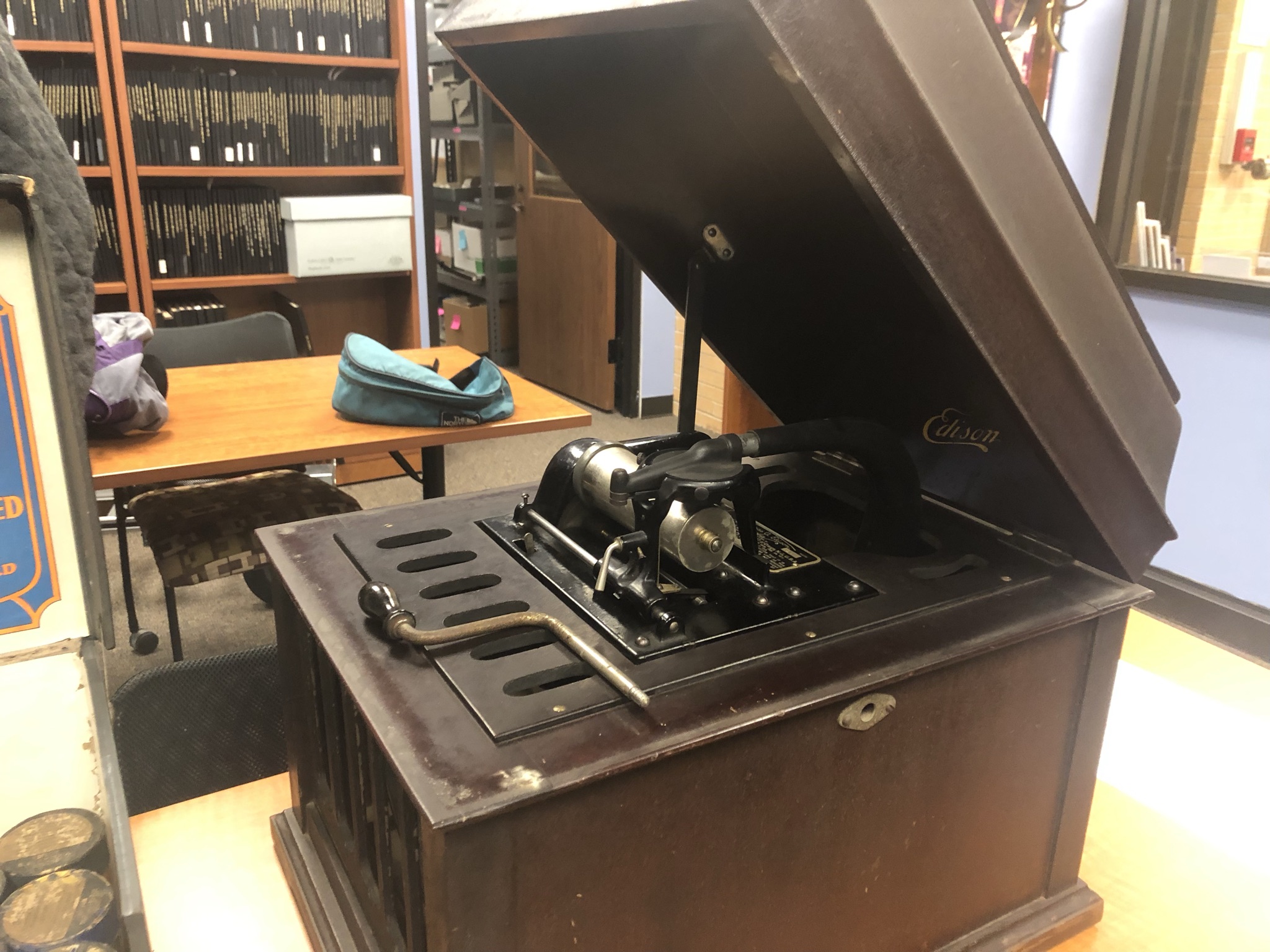
Several of the cylinders contain opera selections, such as “Selection from Rigoletto" (Catalog Number 2100) recorded in 1913 by the Edison Concert Band. Rigoletto was written by Italian composer and librettist Giuseppe Verdi in 1851. Unfortunately, the best-known piece from the opera, "La donna è mobile," is not included in this recording. Verdi is not the only Italian composer represented in the collection. Also released in 1913, "William Tell Fantasie” (Catalog Number 1730) contains an excerpt from Gioachino Rossini’s 1829 opera William Tell. The recording includes the" William Tell Overture," best-known as the theme song of The Lone Ranger, played on the xylophone by Charles Daab and an accompanying orchestra.
In the collection are two recordings of songs by early American songwriter Stephen Foster. Foster's songs were often performed in minstrel shows which commonly mocked African-Americans. The two songs in the collection are "Massa's in de Cold, Cold Ground" (Catalog Number 2447) and “Mammy’s Little Coal Black Rose” (Catalog Number 3116). Other well-known songs of Foster’s include “Camptown Races,” “Old Folks at Home” (also called “Way down upon the Swanee River”), and “Oh! Susanna.”
Two of the songs in this collection are from Hawaii and were recorded before their statehood. These are “Medley of Hawaiian Airs No. 2” (Catalog Number 2941) and “Aloha Oe (Farewell to Thee)” (Catalog Number 1812), which was written by Liliuokalani, the final monarch of Hawaii. Liliuokalani became queen in 1891, was deposed in 1893, and formally abdicated in 1895. She was inspired to write “Aloha Oe” after an 1877 horse ride. Elvis Presley would later cover the song in the film Blue Hawaii.
During the era of the phonograph, one of the most popular forms of entertainment were
vaudeville shows that traveled from town to town. These performances often combined
comedy, music, magic, acrobatics, ventriloquism, trained animals, and various other
entertainment. Vaudeville stars who later saw success on movie and television screens
included Buster Keaton, Charlie Chaplin, Bob Hope, George
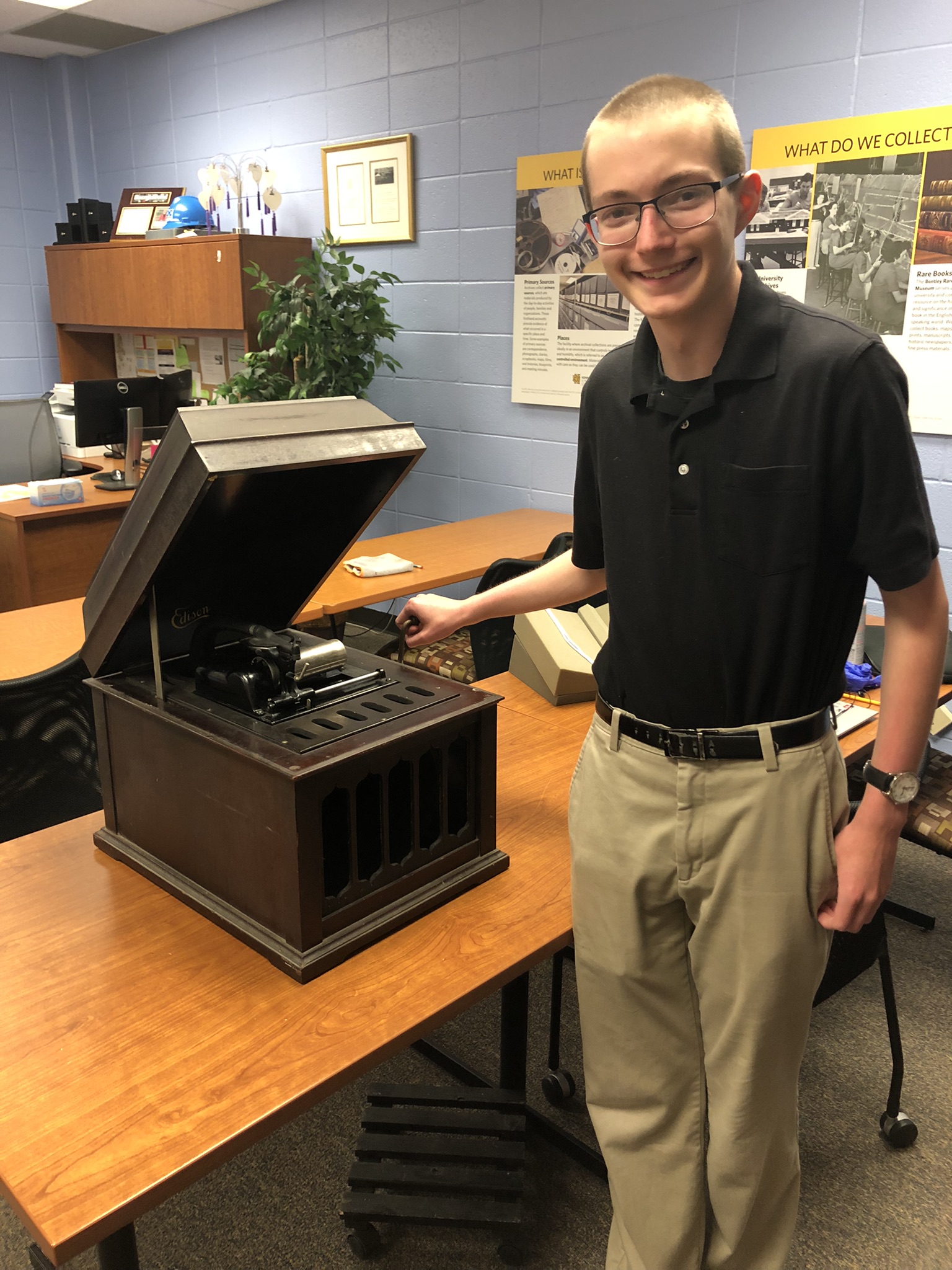
Burns & Gracie Allen, and Will Rogers. A cylinder of the vaudeville performer, Murry K. Hill, is in the Bentley collection. Called "The 'Honest' Hold-up Man and 'Billy Beans' – Vaudeville Specialty" (Catalog Number 2166), the cylinder contains a recording of both a comedy routine and a song.
Other famous performers of the day are also now part of the Bentley collection: Countertenor Will Oakland, known for his exceptionally high voice, with "Nora Acushla" (Catalog Number 1569), Irving Gillette ["When It's Apple Blossom Time in Normandy” (Catalog Number 2017) and “Harmony Bay” (Catalog Number 2372)], and Elizabeth Spencer [“A Little Girl at Home” (Catalog Number 1530), “Here’s to Love—The Sunshine Girl” (Catalog Number 1734), and “I Love You, California” (Catalog Number 1838)].
Popular songwriter Irving Berlin has two songs in the Bentley collection. His well-known songs include "Alexander's Ragtime Band," "Blue Skies," "God Bless America," and "White Christmas." Berlin also wrote the songs for classic movies and musicals like Annie Get Your Gun, White Christmas, and Holiday Inn. His two songs in the Bentley collection are "When I Lost You" (Catalog Number 1738) and "Take Me Back" (Catalog Number 2118).
In the late 1910s, as the world watched the United States enter World War I, pro-war songs became popular. Edward Meeker’s “Watch the Bee Go Get the Hun” (Catalog Number 3614) is an example of this trend. The song describes America as a beehive ready to attack the “Huns,” a derogatory name for Germans from during the war.
Starting with the opera of the 19th century and ending with the war songs of the 20th,
the collection of Edison Cylinders in the Bentley collection covers a vast span of
music and world history. It is amazing to hear these songs played in-person on an
original phonograph: the same way they were enjoyed over a century ago.
Click here to watch Andrew Bramlett operate the Bentley Rare Book Museum's Amberola phonograph.
Sources:
https://www.thomasedison.org/inventions
https://cylinders.library.ucsb.edu/history.php
https://www.theatlantic.com/magazine/archive/2019/11/edmund-morris-edison/598357/
https://www.metopera.org/season/2021-22-season/rigoletto/
https://www.history.com/topics/19th-century/liliuokalani
https://www.pbs.org/wnet/americanmasters/vaudeville-about-vaudeville/721/
https://adp.library.ucsb.edu/index.php/mastertalent/detail/110630/Oakland_Will?Matrix_page=4
https://www.irvingberlin.com/biography
The Vagabonds: The Story of Henry Ford and Thomas Edison's Ten-Year Road Trip by Jeff Guinn
Magnificent Machines: How Men in Sheds have Changed our Lives by James May with Phil Dolling
Doo-dah!: Stephen Foster And The Rise Of American Popular Culture by Ken Emerson








